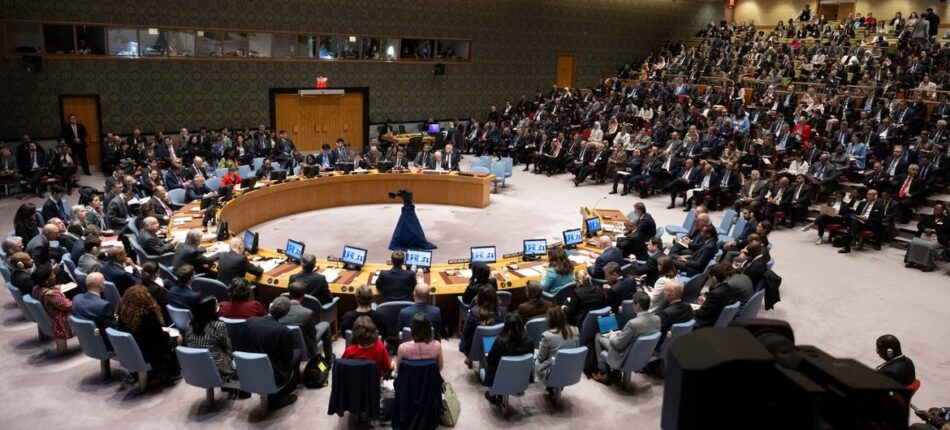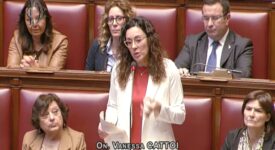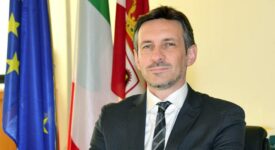
(Il testo seguente è tratto integralmente dalla nota stampa inviata all’Agenzia Opinione) –
///
“Eccellenze,
È importante riconoscere che gli attacchi di Hamas non sono avvenuti nel vuoto. Il popolo palestinese è stato sottoposto a 56 anni di soffocante occupazione.
Hanno visto la loro terra costantemente divorata dagli insediamenti e tormentata dalla violenza; la loro economia soffocata; la loro gente sfollata e le loro case demolite. Le speranze di una soluzione politica alla loro situazione sono svanite.
Ma le rimostranze del popolo palestinese non possono giustificare gli spaventosi attacchi di Hamas. E questi terribili attacchi non possono giustificare la punizione collettiva del popolo palestinese”.
*
António Guterres
Segretario generale Nazioni Unite
24 October 2023Peace and Security
The UN Security Council is meeting at UN Headquarters in New York for what was a scheduled quarterly open debate on the ongoing conflict between Israel and Palestine, now given greater urgency by the Hamas attacks of 7 October and the deepening humanitarian crisis as the Israeli bombardment of the Gaza Strip continues. The UN chief said the situation “is growing more dire by the hour”, repeating his call for an immediate humanitarian ceasefire. Follow lives updates here:
LATEST DEVELOPMENTS:
The afternoon session has resumed. For full blow by blow coverage of the debate so far and the dozens of speakers to come on the Israel-Palestine crisis, you can visit our special UN Meetings Coverage Section, here.
It’s 1.20pm Eastern Standard Time and the Security Council meeting has adjourned in New York but will reconvene later in the afternoon. Dozens of countries still want to have their say, among those to come are Jordan, Egypt, Saudi Arabia and Syria. Check back here for further updates.
Check out our UN News explainer published last week, outlining what happens if ambassadors serving on the Security Council are unable to agree a course of action as has been the case so far with the crisis in Gaza.
Israeli diplomat calls on UN chief to resign
The Israeli ambassador to the UN Gilad Erdan called on the UN Secretary-General to “resign immediately” in a tweet at 11.22am, and at the stakeout outside the Security Council. Foreign Minister Eli Cohen also tweeted that he would not be meeting with the UN chief today for a scheduled bilateral.
Ambassador Erdan told reporters at the stakeout that in noting the Hamas attacks “did not happen in a vacuum” in his address to the Council, the UN chief was “justifying terrorism”.
In response to questions concerning the Foreign Minister’s tweet, the UN Spokesperson Stéphane Dujarric said that the Secretary-General would be meeting family representatives of hostages being held by Hamas in Gaza, adding they would be accompanied by a representative of the Israeli Permanent Mission to the UN.
China
China’s Ambassador Zhang Jun said “the eyes of the entire world are on this Chamber,” calling on the Council to send a powerful, united message.
That includes an immediate ceasefire, which the Council must express in clear, unambiguous language. If not, the two-State solution could be jeopardized. States should uphold a moral conscience not double standards.
Ambassador Zhang Jun of China addresses the UN Security Council meeting on the situation in the Middle East, including the Palestinian Question.
UN Photo/Eskinder Debebe Ambassador Zhang Jun of China addresses the UN Security Council meeting on the situation in the Middle East, including the Palestinian Question.
Turning to the humanitarian situation in Gaza he said urgent efforts are needed. Aid supplies currently allowed to enter the enclave are “a drop in the bucket”. The full siege of Gaza must be lifted alongside the collective punishment of Palestinians.
In this vein, he called on Israel to stop its attacks and allow aid to be delivered, adding that international humanitarian law must be upheld. The Council must defend the rule of law at every level and oppose any violations, he said.
The root cause of the conflict rests in the prolonged occupation of Palestinian territory and a lack of respect for their rights, he said, adding that Council actions must not deviate from this.
Palestinians queue for water in Gaza.
© WHO/Ahmed Zakot Palestinians queue for water in Gaza.
Russia
Vasily Nebenzya Russia’s ambassador to the UN said it was unfortunate the meeting was taking place on UN Day against the backdrop of “unprecedented” violence that has caused “catastrophic” casualties on both sides, with Russians among the victims.
The number of deaths and injuries “bears witness to the fact that scale of the humanitarian disaster in the Gaza Strip has exceeded all of our worst imaginations,” he said.
The “terrible acts” of 7 October and the “tragic events” that followed were the result of years of “destructive positions” that Washington had taken, accusing the US of sabotaging potential solutions to the protracted conflict in the region.
Ambassador Vassily Nebenzia of the Russian Federation addresses the UN Security Council meeting on the situation in the Middle East, including the Palestinian Question.
UN Photo/Manuel Elías Ambassador Vassily Nebenzia of the Russian Federation addresses the UN Security Council meeting on the situation in the Middle East, including the Palestinian Question.
“We along with many others for several years now, have warned that the situation is on the brink of explosion and the explosion occurred,” Mr. Nebenzya said.
“This crisis has once again shown that without fair settlement of the Palestinian-Israeli conflict in line with Security Council and General Assembly resolutions and based on approved international decisions on the two-State solution, regional stabilization will be out of reach,” he added, reiterating Russia’s position that there needs to be a sustainable negotiation process.
“Following this there must be the establishment of a sovereign Palestinian State, within the 1967 borders, with East Jerusalem as its capital, coexisting in peace and security with Israel.”
United Kingdom
Tom Tugendhat the UK’s Minister for Security expressed resolute support Israel’s right to self-defence. At the same time he recognized that Palestinians are suffering, noting that the UK has committed an extra $37 million to support civilians in Gaza.
“We must prevent this conflict sparking conflict beyond Gaza and engulfing the wider region in war,” he said, pointing to Hezbollah attacks on Israel’s northern border and rising tensions in the West Bank. “It is in the interest of Israeli and Palestinian civilians and all States in the region, that this conflict does not spread further.”
Foreign Minister Tom Tugendhat of the United Kingdom addresses the UN Security Council meeting on the situation in the Middle East, including the Palestinian Question.
UN Photo/Manuel Elías Foreign Minister Tom Tugendhat of the United Kingdom addresses the UN Security Council meeting on the situation in the Middle East, including the Palestinian Question.
The UK’s longstanding position on the Middle East Peace Process supports a negotiated settlement leading to a safe and secure Israel living alongside a viable and sovereign Palestinian state.
“The events of the past week show with total clarity, the need to achieve these goals,” he said. “Hope and humanity must win out.”
France
Catherine Colonna France’s Minister for Europe and Foreign Affairs said it is “high time” for the Council to shoulder its duty to condemn Hamas’ attack in Israel.
France stands firmly with Israel which has the right to defend itself, while respecting international humanitarian law. Indeed, all civilian lives must be protected she stressed.
Foreign Minister Catherine Colonna of France addresses the UN Security Council meeting on the situation in the Middle East, including the Palestinian Question.
UN Photo/Eskinder Debebe Foreign Minister Catherine Colonna of France addresses the UN Security Council meeting on the situation in the Middle East, including the Palestinian Question.
Safe, swift aid access is urgently needed in Gaza; “each minute counts”, she said, calling for humanitarian pauses and a truce that could lead to a sustained peace, underlining France’s continued provision of aid to the enclave.
At the same time the Council must mobilize and fully exercise its responsibilities, she added.
“It is our duty to pave the way to peace,” she said. “The only viable solution is the two-State solution. We need to do all we can. This Council must act and it must act now.”
United States
US Secretary of State Antony Blinken told ambassadors around the horseshoe table that among the more than 1,400 people Hamas killed on 7 October were citizens of over 30 UN Member States, including Americans.
“Every one of us has a stake, every one of us a responsibility in defeating terrorism,” he said.
He also underscored the vital need to protect civilians, adding that Israel has the “right and the obligation” to defend itself and “the way it does so, matters.”
US Secretary of State Antony J. Blinken addresses the Security Council meeting on the situation in the Middle East, including the Palestinian question.
UN Photo/Manuel Elías US Secretary of State Antony J. Blinken addresses the Security Council meeting on the situation in the Middle East, including the Palestinian question.
Secretary Blinken said that Hamas does not represent the Palestinian people and Palestinian civilians are not to blame for the “carnage” committed by the militants.
“Palestinian civilians must be protected, that means Hamas must cease using them as human shields. It is hard to think of an act of greater cynicism,” he said.
He noted that Israel must take all possible precautions to prevent harm to civilians and that food, water, medicine and other humanitarian assistance must be able to flow into Gaza and to the people who need it.
He also said that civilians must be able to get out of harm’s way, urging the consideration of humanitarian pauses.
Amid relentless violence, families flee their shattered homes in Tal al-Hawa neighbourhood, seeking refuge in the southern Gaza Strip..
© UNICEF/Eyad El Baba Amid relentless violence, families flee their shattered homes in Tal al-Hawa neighbourhood, seeking refuge in the southern Gaza Strip..
Brazil
Maura Viera Minister for Foreign Affairs of Brazil underscored that under International Humanitarian Law, Israel as the occupying power “has the legal and moral obligation” to protect the population of Gaza.
“Recent events in Gaza are particularly concerning including the so called evacuation order, which is leading to an unprecedented level of misery for innocent people.”
Foreign Minister Mauro Vieira of Brazil addresses the UN Security Council meeting on the situation in the Middle East, including the Palestinian Question.
UN Photo/Eskinder Debebe Foreign Minister Mauro Vieira of Brazil addresses the UN Security Council meeting on the situation in the Middle East, including the Palestinian Question.
He added that the amount of aid flowing into Gaza through the Rafah crossing is “certainly insufficient” to meet the needs of the civilian population in the enclave noting that the lack of power is impacting healthcare workers and hospitals – with safe water supplies very limited.
“Civilians must be respected and protected at all times and everywhere,” the Minister stressed, reminding that all parties must “strictly abide” by their obligations under international law.
“I highlight in this respect the fundamental principle of distinction, proportionality, humanity, necessity and precaution which must guide and inform all actions and military operations,” he said.
Israel
11.04: Israel’s Foreign Affairs Minister Eli Cohen holding up a collage of those kidnapped by Hamas, said the hostage situation is a “living nightmare”. Recalling the 7 October attack on Israel, he said the day “will go down in history as a brutal massacre” and a “wake-up call” against extremism and terrorism.
Foreign Minister Eli Cohen of Israel addresses the UN Security Council meeting on the situation in the Middle East, including the Palestinian question.
UN Photo/Manuel Elías Foreign Minister Eli Cohen of Israel addresses the UN Security Council meeting on the situation in the Middle East, including the Palestinian question.
“Hamas are the new Nazis,” he said, calling for immediate access to hostages and their unconditional release.
Qatar could facilitate.
“You, members of the international community, should demand Qatar to do just that,” he said. “The meeting should conclude with a clear message: bring them home.”
Israel has a right and duty to defend itself, he said. “It’s not just Israel’s war. It’s the war of the free world.”
The proportional response to the 7 October massacre is “a matter of survival,” he said, thanking nations for supporting Israel.
“We are going to win because this war is for life; this war must be your war as well,” he said. Right now, the world faces a “clear choice of moral clarity”.
“One can be part of the civilized world or surrounded by evil and barbarity,” he said. “There is no middle ground.”
If all nations do not stand decisively by Israel’s mission to “eliminate the monsters from the face of the Earth”, he said this will be “the darkest hour of the UN” which will “have no moral justification to exist”.
Foreign Minister Riad Al-Malki of the State of Palestine addresses the Security Council meeting on the situation in the Middle East, including the Palestinian question.
UN Photo/Eskinder Debebe Foreign Minister Riad Al-Malki of the State of Palestine addresses the Security Council meeting on the situation in the Middle East, including the Palestinian question.
State of Palestine
10.45: Riyad al-Maliki Minister of Foreign Affairs of the State of Palestine stated that the Security Council and the international community has a duty and an obligation to save lives.
“Continued failure at this [Security] Council is inexcusable,” he stressed.
He emphasized that only “international law and peace” were worthy of unconditional support by countries, adding that “more injustice and more killing, will not make Israel safer.”
“No amount of weapons, no alliance, will bring it security – only peace will, peace with Palestine and its people,” he said, stating: “the fate of the Palestinian people cannot continue to be dispossession, displacement, denial of rights and death. Our freedom is the condition of share peace and security.”
Mr. al-Maliki stressed that avoiding an even greater humanitarian catastrophe and regional spillover, “it must be clear that this can only be achieved by putting an immediate end to the Israeli war launched against the Palestinian people in the Gaza Strip. Stop the bloodshed.”
Tweet URL
‘Humanity can prevail’
Briefing the Council, Lynn Hastings, UN Humanitarian Coordinator in the Occupied Palestinian Territory, said agreement on the resumption of aid deliveries through the Rafah, Egypt, crossing and the release of a small number of hostages over the past few days “shows that through diplomacy and negotiation, humanity can prevail, and we can find humanitarian solutions, even in the depths of conflict”.
The world is looking to the Member States around this Council to play its part – Lynn Hastings
Urging all countries with influence to exert it and ensure respect for international humanitarian law, she said civilians must have the essentials to survive. As such, the passage of rapid and unimpeded humanitarian relief must be facilitated, and water and electricity connections resumed, she added.
She said that 20 more trucks are due to move over the Rafah crossing today “although they are currently delayed.” She said the UN was dtermined “to do our part to ensure these deliveries continue.”
She paid tribute to the 35 UN Palestine relief agency (UNRWA) colleagues who have tragically been killed during the Israeli bombardment.
Parties on all sides “must take constant care, to spare civilians”, with water and electricity connections resumed, in accordance with the rules of war.
10.38: “If we are to prevent any further descent into this humanitarian catastrophe, dialogue must continue – to ensure essential supplies can get into Gaza at the scale needed, to spare civilians and the infrastructure they depend on, to release hostages, and to avoid any further escalation and spillover,” she said. “The world is looking to the Member States around this Council to play its part in leading the way.”
‘The stakes are astronomically high’: Wennesland
Addressing the current risk of conflict expanding to the wider region, the UN Special Coordinator for the Middle East Peace Process, Tor Wennesland, said he and the UN Secretary-General have been pursuing “any and every opportunity” to address the situation on the ground and to prevent further civilian death and misery.
10.28: “It is critical, that we, as a united international community, employ all our collective efforts to end the bloodletting and prevent the further expansion of hostilities, including in the region,” he said. “The stakes are astronomically high, and I appeal for all relevant actors to act responsibly.”
Any miscalculation could have “immeasurable consequences”, he warned, adding that these devasting events were not divorced from the broader context in the Occupied Palestinian Territory, Israel, and the region.
For a generation, hope has been lost, he underlined.
“Only a political solution will move us forward,” he said. “The steps we take to address this crisis must be implemented in a way that ultimately advances a negotiated peace that fulfils the legitimate national aspirations of Palestinians and Israelis – the long-held vision of two-States, in line with UN resolutions, international law, and previous agreements.”
‘More dire by the hour’: Guterres
10.11: Mr. Guterres gave what he termed an introduction to the current crisis, saying the situation in the Middle East is “growing more dire by the hour”.
“Divisions are splintering societies and tensions threaten to boil over.”, he said.
“It is vital to be clear on principles” he added, starting with the protection of civilians.
Secretary-General Guterres underscored the need for an immediate humanitarian ceasefire, “to ease epic suffering, make the delivery of aid easier and safer and facilitate the release of hostages”.
Watch the UN chief’s full remarks here:
He also emphasized that the world cannot lose sight of the only realistic foundation for peace and stability in the Middle East – a two-State solution.
“Israelis must see their legitimate need for security materialized and Palestinians must see their legitimate need for an independent State realized, in line with UN resolutions, international law and previous agreements.”
What’s at stake
It marks the fourth time the 15 ambassadors of the UN’s premier peace and security body will convene since the intense cycle of violence began.
You can follow all the proceedings live on X broadcast by our colleagues at UN Web TV – click on the tweet here on the page, or click on the video embedded in the main photo area of this story.
So far, there has no agreement on any action, to alleviate the suffering of civilians caught up in the spiralling conflict between Hamas militants, who control the enclave of over two million Palestinians.
The Council failed to adopt two previous draft resolutions addressing the escalation. The first from Russia calling for an immediate ceasefire, failed to get enough votes, while a Brazilian draft was vetoed by the United States. Although it called for humanitarian pauses for aid access, the US determined objected to the fact it did not mention Israel’s right to self defence.
The UN chief António Guterres is due to brief today along with the UN Special Coordinator for the Middle East Peace Process, Tor Wennesland.
UN Humanitarian Coordinator for the Occupied Palestinian Territory Lynn Hastings is also down to brief. She’s also been given the brief of deputy special coordinator.
Foreign ministers from several countries are also due to take part.
So far, 92 different countries have signed up to speak.
Today is also United Nations Day, marking 78 years since the UN Charter entered into force. In a statement the UN chief said that “at this critical hour, I appeal to all to pull back from the brink before the violence claims even more lives and spreads even further.”
10.02: The Council chamber is abuzz with diplomats exchanging views and awaiting the start of the meeting, which will be chaired by Brazil, which holds the presidency for the month of October.
10.07: The 9451st meeting of the UN Security Council is called to order…








